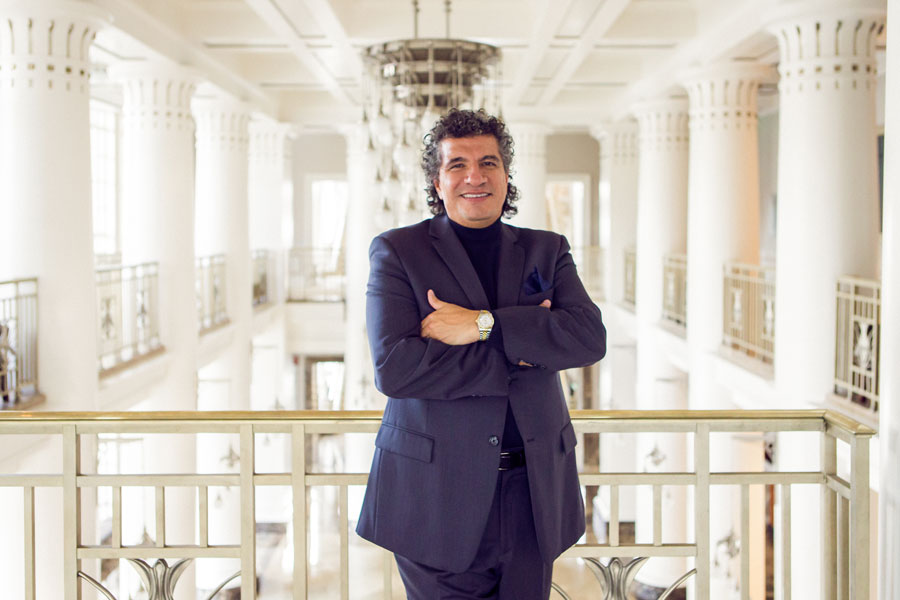Giancarlo Guerrero, a native of Costa Rica, is a five-time Grammy award winning Music Director of the Nashville Symphony Orchestra, a post he has held since 2009 and recently committed to through the 2024-25 season. Guerrero previously held posts as the Principal Guest Conductor of The Cleveland Orchestra Miami Residency from 2011 to 2016, Music Director of the Eugene Symphony between 2002 and 2009, and Associate Conductor of the Minnesota Orchestra from 1999 to 2004. The Narodowe Forum Muzyki is very pleased with the appointment of Giancarlo Guerrero to the position of Artistic Director of the Wroclaw Philharmonic! Guerrero will conduct four weeks during the 2017 season in Wrocław, and beginning with the 2018 season, he will spend eight weeks per season with the orchestra in addition to touring and recording activities.
Agnieszka Franków-Żelazny was born on March 24, 1976, in Głubczyce. She graduated from the University of Wrocław in 2000 with a degree in biology. That year, she founded the Kameralny Chór Akademii Medycznej (Medici Cantantes Choir at the Medical University of Wrocław). In 2004, she received a diploma from the Karol Lipiński Academy of Music in Wrocław, where she studied Music Education and was awarded a diploma in 2005 from the Vocal Department. During this time, she was honoured with the first prize in the National Contest for Choir Conductors. In 2006, she completed the Postgraduate Voice Production and Training Programme at the Academy of Music in Bydgoszcz. Since June 2006, Franków-Żelazny has been the artistic director of the National Forum of Music Choir. In 2008, she was awarded a special prize for conductors from the 39th Legnica Cantat National Choir Contest. Franków-Żelazny became the head of Polish National Youth Choir, which she also founded, in 2013. She completed course work at the Academy of Culture Leaders at the Economic University of Kraków, in 2014 and was distinguished with the Gloria Artis Bronze Medal for Merit to Culture. The following January, she was named the programme director of the Choral Academy of the National Forum of Music. In 2016, Franków-Żelazny was a music curator for the year that Wrocław served as the European Capital of Culture. The album DE PROFUNDIS – Polish Psalms of the 20th and 21st Century with the NMF Choir under her direction was awarded the Fryderyk prize for the best choral, oratorio and orchestra music, 2017. She currently works as an Associate Professor at the Academy of Music in Wrocław.
Carl Orff was born in Munich and was raised amongst German cultural traditions. He graduated from the Munich Academy of Music with a portfolio of compositions influenced by Debussy's innovations. He then turned to the Viennese experiments of Schoenberg, Strauss and Pfitzner. Later, he held the positions of Kapellmeister at the Munich Kammerspiele as well as theatres in Darmstadt and Mannheim, However, by his early 20s, he was engaged for military service.
Carmina Burana: Secular Songs for Soloists and Chorus with Accompanying Instruments and Magic Tableaux, as Orff titled it, was first performed at the Frankfurt Opera on June 8, 1937. As his title suggests, the composer intended the work to be performed semi-theatrically, with dance sequences. The development of Carmina Burana combined Orff’s great talent for theatrical spectacle, his interest in medieval forms, and the return the musical innocence he embraced as an educator. The oratorio's texts were drawn from a collection of lyrics dating from the 12th and 13th centuries discovered at a monastery in Upper Bavaria by the musicologist J.A. Schmeller in 1847. The verses were mostly in Latin with some in early forms of German and French, and their content was filled with lusty verses that celebrated the pleasures of loving and drinking with commentary on the idiosyncrasies of plebeian life. They had been produced by poets who offset the severity of religious traditions in the Middle Ages with earthiness and a seemingly ageless humour.
Orff chose 25 songs for Carmina Burana, which, Michael H. Kater claims, used “many of [his] favorite structural elements: monody [a type of accompanied solo from the Renaissance], allusions to the Volkslied [folk songs], modal influence, a bareness in phrasing which, combined with repetitive techniques, bordered on the primitive but conveyed at the same time the impression of archetypal, elementary dynamics.” His musical influences included ancient Greek drama, Bavarian folk song, Gregorian chant, Baroque opera, and Stravinsky’s Oedipus Rex and Les Noces.
Orff described the effect the collection had on him saying, "I obtained the book on Maundy Thursday 1934, a memorable day for me. Right when I opened it, on the very first page, I found the long-famous illustration of 'Fortune with the Wheel,' and under it the lines: 'O Fortuna velut Luna statu variabilis…' The picture and the words took hold of me. Although I was, in the beginning, only acquainted with the broad outlines of the contents of the poetry collection, a new work, a stage work with choruses for singing and dancing, simply following the pictures and text, sprang to life immediately in my mind. That very day I had sketched the first chorus, O Fortuna, in short score. After a sleepless night during which I nearly lost myself in the voluminous poetry collection, a second chorus, Fortune plango vulnera, was finished, and on Easter morning, a third, Ecce gratum, was put on paper."
Though not often performed fully staged, the work has become an established part of classic choral repertory and has often been used for dramatic effect in movie scores, television commercials, spectacles of all kinds and even video games.
Alixandra Porembski, English Language Annotator

